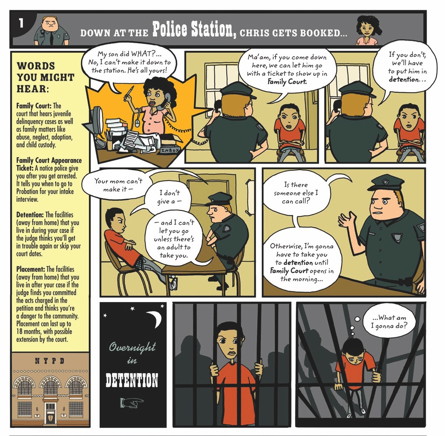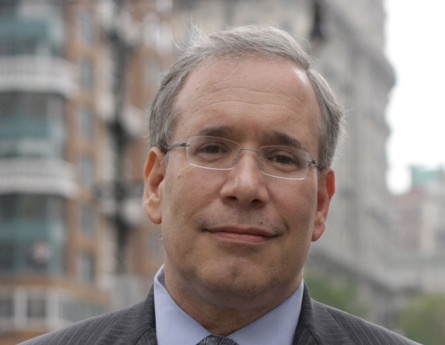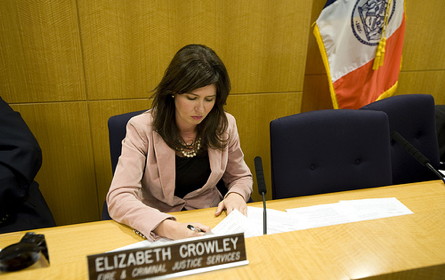
NEW YORK — It is unlikely anyone could have predicted what would happen in the last months of 2012 — and how it would shape the civic conversation among New Yorkers.
In late October, Superstorm Sandy devastated coastal communities in New York and New Jersey, stoking the public debate over the need to rethink housing, hospitals and other critical infrastructure — with some people even raising the possibility of rolling back waterfront development. And, days before Christmas, there was the mass killing of children and staff at an elementary school in Newton, Conn., that, while not in New York, was expected to galvanize support for gun control in Albany.
But these were just the most recent, sharpest events of a year that was marked by policy debates over the police department's "stop, question and frisk" tactics, paid sick leave, the size of sugary drinks, ethics in Albany and the role of money in elections.
What is ahead in 2013? In large part, the public conversation in New York City will be defined by the response to Sandy and the elections that will bring to office the first new mayor in over a decade as well as a new roster of lawmakers to the City Council and other elected offices. There will also be much talk about gun control, at least early in the year, with Gov. Andrew Cuomo and other state lawmakers promising a new push on stricter laws in January's session.
As usual, we reached out to elected officials and thought leaders to get their forecasts on the coming year. Besides city elections and Sandy recovery, our aspiring soothsayers made bold predictions about state politics, the transit system and campaign finance reform — as well as the prospects of the Buffalo Bills and the New York Knicks.
But, before we get to the 2013 predictions, here's a quick look at the scorecard for last year.
Colin Campbell of Politicker was among the winners, getting one big prediction right when he said, “All hope for independent redistricting will turn out to be mere naive wishfulness — redistricting will be just as partisan next year as it's always been.”
State redistricting was just as partisan as any year — we even saw the addition of a Senate seat in upstate New York that is at the center of a still contested race weeks after the general election: Only 30-something votes separate Democratic candidate Cecilia Tkaczyk and Republican Assemblyman George Amedore. A judge has certified the race for Amedore, but Democrats have appealed.
The New York Public Interest Group’s Bill Mahoney and Gene Russianoff of the Straphangers Campaign also got some predictions right.
Mahoney predicted that the much-ballyhooed Joint Commission On Public Ethics would miss a deadline for setting rules for independent expenditures, which it did. Meanwhile, Russianoff not only predicted the return of poetry to subway cars but also the fare hike that came as an unwanted Christmas gift to millions of New Yorkers.
“Sadly, the fare will go up at the end of 2012,” Mahoney said last year. “That's the MTA plan." And so it went: It was announced that the base fare would go from $2.25 to $2.50, the 7-day MetroCard $1 to $30 and the 30-day MetroCard $8 to $112.
Others did not do not score so well. Councilman Ydanis Rodriguez predicted a "huge surge" of activity from the Occupy Wall Street movement once the weather got warm and that state Sen. Adriano Espaillat would win elections to the U.S. House of Representatives — neither of which came true.
Instead, OWS mobilized for hurricane relief as Occupy Sandy, becoming one of the most high-profile (and some would say effective) groups to respond to and provide on-the-ground help to traumatized communities (to be fair to Rodriguez, he wasn't the only one to predict a rejuvenated OWS — John Petro of the Drum Major Institute said Occupy "mass protests" in 2012 would "dwarf" the previous autumn's.)
Meanwhile, Espaillat lost a tough race to incumbent Congressman Charlie Rangel, after a protracted battle over the tallying of votes by the city's Board of Elections. Espaillat instead won re-election to the state Senate.
Perhaps because of the very tenuous nature of predictions, some elected officials and policymakers declined requests to comment. While some people who were contacted agreed to be interviewed in the late weeks of December, others provided statements. Those statements have been edited only for style and clarification. — David Howard King and Cristian Salazar
2013 Predictions
Council Speaker Christine Quinn
1. Council hearings on city response to Sandy results in improved storm preparedness.
2. Volunteers participating in the Council’s Clinic Protection Project help to increase New Yorkers' access to healthcare.
3. Council passes law that rejects quick fixes and holds landlords accountable for repairing underlying conditions, leads to real improvements for tenants.
4. New York Jets announce the release of Sanchez and Tebow in favor of rookie quarterback sensation Jimmy Oddo of Staten Island.
Bill Thompson, 2013 mayoral candidate
Thompson said that rebuilding after the hurricane is “going to be a big part of next year’s discussion,” especially “how we rebuild.”
He also said that the storm emphasized the need for a serious discussion of fairness and equity in the city.
“I think that one thing you are going to hear about a lot in the mayoral election … [is] about the need to be one city,” Thompson said in a recent interview. “I think a number of communities after the hurricane, and also last year in the snowstorm, felt that they were abandoned.”
Turning to sports, Thompson said “it would be nice to see the Mets in the playoffs this year.” But his most ambitious prediction was for the Knicks: “We could be hoisting a championship banner in the Garden ... If they blend everything together, the Knicks could be awesome.”
New York City Comptroller John Liu
•New York City will become the most financially transparent municipality in the country when Checkbook 2.0 is unveiled.
•We will continue to strive to recoup the millions in fraudulent billing on the 911 call center upgrade.
•The Economic Development Corp. will finally have some sense of accountability as a result of new contract provisions negotiated by our office.
•The city’s own “fiscal cliff” will continue to loom because of the mayor’s failure to negotiate in good faith with labor.
•The pension funds will help finance the rebuilding of our city in the aftermath of Superstorm Sandy.
•The mayor will realize that city taxis should be accessible to all New Yorkers.
•As a dad, I will be negotiating the NYC public high school admission process for my son.
•As if my schedule isn’t hectic enough, I predict it will be even busier in 2013.
Kathryn Wylde, Partnership for New York City
In 2013, many important players in the city's leading export industries — financial services, media, professional services, fashion and design — will decide whether to recommit to New York or relocate significant numbers of jobs and even headquarters to more business-friendly locations. Decisions will be based on both local and global factors. Of critical importance will be the election of a mayor who is prepared to work with the business community, maintain a healthy economy, and hire great people to manage the city. A clear plan for insulating the city's power, transportation and communications infrastructure against weather and other causes of failure will also impact decisions. Finally, the actions of Gov. Cuomo's recently appointed tax commission will signal whether New York will be a more competitive place from which to run a business, or not.
Decisions made in Washington are equally important, starting with a satisfactory solution to the country's fiscal and debt crisis that does not terribly disadvantage New York taxpayers. Similarly, employers will be watching for reform of U.S. immigration policies so that they can recruit and retain global talent.
My prediction is that, regardless of campaign rhetoric, no New York City mayor will want to preside over an exodus of jobs and industry leaders. On Nov. 7, we are likely to see whomever is elected reach out for managerial expertise and policy input from business, and I am confident that the city's business community will be willing to help. On the other hand, when it comes to Washington D.C., it is harder to predict a good outcome. On every critical issue, New Yorkers better be prepared for a fight!
Michael McKee, Tenants Political Action Committee
Gov. Andrew Cuomo will recognize that the transactional deal that he has made with the State Senate Republicans and the Kleiniacs has positioned him too far to the right. The governor will give an interview to Fred Dicker in which he will admit that he was wrong to allow the Senate Republicans to draw their own district lines, he was wrong not to endorse Democrats running on a genuine progressive agenda such as Cecilia Tkaczyk, Justin Wagner, and Ted O’Brien (especially as their opponents were, to put it kindly, extreme right wingers), and that he was wrong to refuse to use his talents and power to unify the Senate Democratic conference following the November 6 election. The next day’s headline in the Daily News: “A bad case of buyer’s remorse.”
Constantly demonstrating dignity and integrity, Andrea Stewart-Cousins will become a statewide media star as impatient reporters and editors increasingly seek to cut through the spin normally produced in the state capitol.
Jeff Klein will give back all the real estate campaign contributions he has collected, and will finally become a sponsor of Sen. Stewart-Cousins’ bill to repeal vacancy destabilization.
During 2013, the irreverent Albany press corps will invent four new coinages similar to “the Kleiniacs” and “Skleinos” to describe the ever-shifting landscape on Planet Albany.
Andrew Cuomo will see the handwriting on the wall and will become co-chair of the “Draft Hillary in 2016” committee.
Karen Scharf, Citizen Action
The November election results are proof positive that New Yorkers are no longer willing to accept elections dominated by CEO campaign contributors. New Yorkers elected new legislators who ran on the need to reform our broken campaign finance system and for publicly financed fair elections. I expect before the end of the legislative session, these new Senators and Governor Cuomo will succeed in getting the Senate to join the Assembly in passing publicly funded Fair Elections.
Gene Russianoff, NYPIRG’s Straphangers Campaign
1. The next MTA Chairman will resign after four days, setting a record for the shortest time in that post. When interviewed about her short tenure, she said, "Whoops, I had no idea how unpopular you'd be."
2. The City Council will pass legislation mandating that employers offer their workers the option of having transit costs excluded from their income. Both employers and employees will save significantly.
3. The candidates for mayor will all pledge to expand Select Bus Service around the city. SBS — now in operation on four routes — speeds buses by 20 percent or more through such features as paying your fare in advance at the bus stop, a painted exclusive lane and camera enforcement of the lane.
4. The number of stations with "countdown" clocks will increase substantially in 2013.
Linda Sarsour, executive director, Arab American Association of New York
Sarsour predicted that mayoral hopefuls will need to make police reform a part of their platform. She emphasized that the Community Safety Act, a package of legislation currently before the City Council, has immense support from communities of color. Among other changes, the Act would mandate a police inspector general to oversee the department.
“Every candidate better have something to say about police reform ... Particularly so communities of color feel safe. And if it is not something you are talking about or prioritizing–you won’t get our [Arab-American] vote,” she said.
Assemblyman Brian Kavanagh
Assemblyman Brian Kavanagh said he predicts that a package of legislation on gun control will be signed by Gov. Cuomo in January because after the shootings in Connecticut the issue for stronger gun laws has become even more urgent and hopefully state senators have reached a consensus that it is “time to act.”
“In light of yet another tragedy we are prepared to get these bills passed. We think we have a new coalition and a Governor who is really working with the Senate to pass these bills to make stronger gun laws,” he said adding, “We will make it priority to get these bills to the floor of both houses of the Legislature, and get it to the Governor to be signed by January.”
Bill Mahoney of NYPIRG
New Yorkers will finally see the realization of two long-sought goals: Campaign finance reform will pass both houses of the Legislature and the Buffalo Bills will make the playoffs.
State Sen. Jose Serrano
1. I predict that Senate Democrats will unite in Albany to pass a progressive agenda that reflects the will of the voters — an agenda which includes increasing the minimum wage, real campaign finance reform, and most importantly, gun control.
2. I also predict this will be a banner year for tourism in New York State with the arts and parks leading the way. This will be done thanks in part to Gov. Cuomo, who continues to invest in parks which provide a five-to-one return on investment, and the state Legislature, which actually passes my “pennies for parks” legislation to help our environment and expand our wonderful parks system.
State Sen. Mike Gianaris
I can tell you what we hope to get accomplished — whether we do relies on people other than us. But we’re looking forward to getting the economy back on track, getting people more jobs, increasing the minimum wage so those jobs are good paying jobs, enacting the progressive agenda that we got elected on, campaign finance reform, protection of reproductive health rights, protections for women in the workplace and, of course, sensible gun laws that are needed to make our streets safer and our schools safer. So, its an ambitious agenda, but we’ve got a governor who is on board with it and we are looking forward to making it happen.
Billy Easton, executive director, Alliance for Quality Education
1. The New York City mayoral election will prove to be a referendum on the Bloomberg school reform agenda. Weary of continuous school closings, divisive rhetoric bashing teachers and dismissing parents and students, voters will provide a clear mandate for a change of direction. This will be welcome news for students and families because after 12 years of this agenda only one in four students, and 13 percent of black and Latino students, are college-ready.
2. Statewide there will be a big fight over the relationship between the state education budget and the quality of education as parents, students, teachers and administrators from all parts of the state simply can no longer tolerate the continuous cuts to effective educational programs that are the result of inadequate state school aid. While such fights have traditionally been focused on large urban communities primarily represented by Democrats, small cities and rural areas represented by Republicans will play an increasing role in demanding fair and adequate school aid. This will result in greater pressure on upstate Republican Senators. Ironically, the new coalition between the Independent Democrats and the Republicans in the Senate will create an atmosphere where it becomes increasingly difficult for school aid debates to be strictly partisan affairs as pressure mounts for senators to work across party lines for the benefit of high need schools in all regions of the state.
___
Additional reporting by Kamelia Kilawan.















